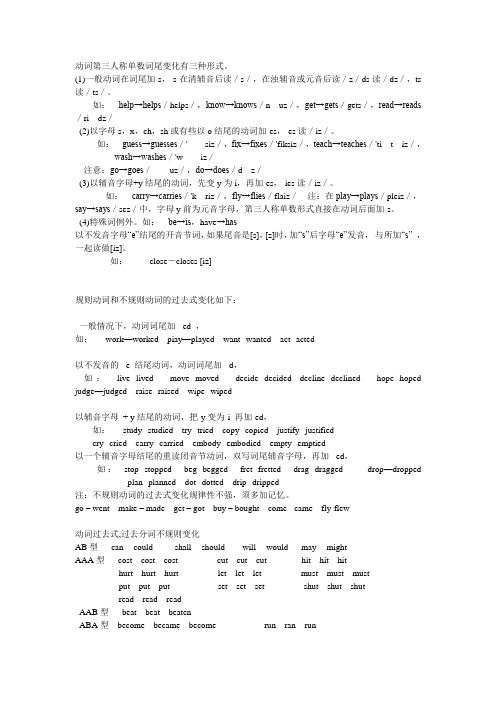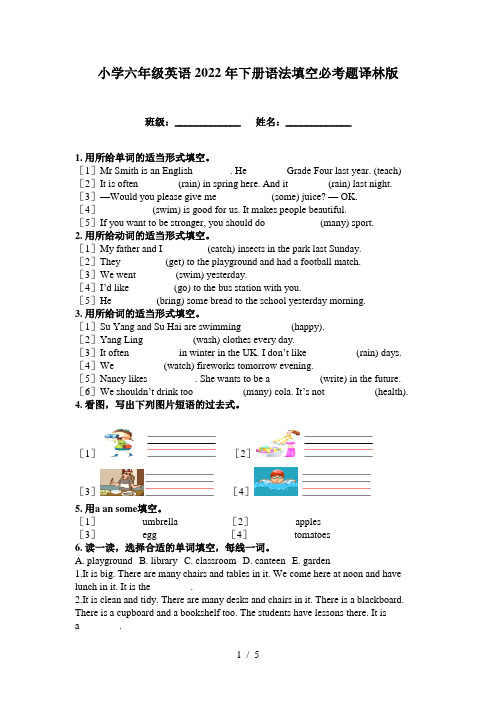bring的第三人称单数
译林英语六年级下册英语第五单元课时练习、单元测试卷(含答案)sc

译林英语六年级下册英语第五单元课时练习、单元测试卷(含答案)scUnit 5 A partyStory time 第1课时⼀、按要求写词。
1.child(复数)2.balloon(复数)3.appear(第三⼈称单数形式)4.one(序数词)5.be(复数)6.have fun(同义词)7.begin(近义词)8.snack(复数)9.drink(复数)10.bring(第三⼈称单数形式)⼆、英汉互译。
1.举⾏⼀个聚会2.⼀些⽓球3.玩得开⼼4.看我5.从……带来……6.bring some snacks7.Children’s Day8.at my house9.play with me 10.Here you are.三、单项选择。
( )1.There a party Liu Tao’s house next week.A.is; onB.is going to be; atC.is; at( )2. Day is on June 1st in China.A.ChildB.ChildrenC.Children’s ( )3.—are you going to do at the party? —I am going to play the guitar.A.WhatB.Where( )4.My sister Su Yang brings some snacks Mike’s house.A.toB.inC.at( )5.Are we going to eat play with the toys first?A.andB./C.or( )6.My father our grandparents by plane next Friday.A.visitsB.is going to visitC.visit( )7.Yang Ling is going to bring some fruit the supermarket.A.fromB.toC.in( )8.Let’s a good time first!A.hadB.hasC.have四、根据⾸字母或汉语提⽰补全单词。
名词变复数发音,动词过去式第三人称单数和现在分词

一名词的复数形式,一般在单数形式后面加s或es. 现将构成规则与读一名词的复数形式,一般在单数形式后面加s或es. 现将构成规则与读音规则音规则:二英语里有一些名词的复数形式不是以词尾-s或-es构成,它们的构成方法主要如下表:名词复数发音规则以元音音素结尾的加了“s”后发/z/音如:windows \ doors\ computers \centers以清辅音结尾的加了“S"后发/s/音如:chicks \ maps\ cups以字母t结尾的发/ts/音如:mats \ cats\ aunts以字母d结尾的发/dz/音如:birds \ words\ hands其他辅音音素结尾的都发/z/音。
特殊变化的词根据变化后结尾音变化同上如:butterfly-butterflies变化后结尾音/ai/为元音,所以发/z/音。
------------------------------------------------------------------------------------A.“单数→复数”的规则变化(1)名词词尾发音为[s, z, , , , ]时,加“-es”(如词尾有“-e”只加“-s”)并发[-iz]音,形成一个音节,也就是本项名词为单音节时,加了“-es”便成为双音节的单词。
class[kla:s]→classes[kla:siz]班级phrase[freiz]→phrases[freiziz]短语dish[di]→dishes[diiz]盘,碟garage[ 'gærɑ: ]→garages['gærɑ:iz]车库watch[ w ]→watches[ w iz]手表bridge[bri]→bridges[ br iiz]桥梁(2)名词词尾发音为[p, t, k, f, θ]等清辅音时,加“-s”并发[-s]音。
例如:cup[kp]→cups[kps]茶杯cat[kt]→cats[kts]猫book0[buk]→books[buks]书roof[ru:f]→roofs[ru:fs]屋顶month[mnθ]→months[mnθs]月注:“stomach”(胃),“monarch”(君主)等的复数是词尾加“-s”而不是加“-es”,因为这些词的词尾“-ch”的发音是[-k]。
2018-2019-单词brought是什么中文意思-word范文模板 (3页)

本文部分内容来自网络整理,本司不为其真实性负责,如有异议或侵权请及时联系,本司将立即删除!== 本文为word格式,下载后可方便编辑和修改! ==单词brought是什么中文意思我们要知道英文单词brought的读音,还要知道它具体的中文意思。
以下是小编为大家整理了英语单词brought详细的中文意思,一起来看看吧!brought的中文意思英 [brɔ:t] 美 [brɔt]原级:bring第三人称单数:brings现在分词:bringingbrought 基本解释动词带来( bring的过去式和过去分词 ); 促使; 提供; 使朝(某方向或按某方式)移动情景对话道谢及回答A:Guess what I’ve brought for you.猜猜我买了什么给你。
B:Oh, a bouquet of flowers. It’s very kind of you.哦,一束花。
你真是太好了。
A:I hope you like it.我希望你喜欢它。
B:I love flowers, you know. Thank you very much.我爱花,你知道的。
太谢谢了。
A:That’s all right.没什么。
brought的单语例句1. The majority of overseas companies doing business in China respects the country's laws and has brought their activities in line with the law.2. Newton tells China Business Weekly that she brought her wines to China to learn about local people and the local market.3. Unfortunately for a Shanghai store that sold pirated luxury handbags, the incident brought so much attention they were busted for selling fake goods.4. Lion and dragon dances as well as yangko folk dance brought about much bustle and excitement.5. Butler's contract was terminated following his suspension for six months for claiming that two players brought female guests to their hotel rooms after a curfew.6. The case was brought to court last April by the girl's birth mother.7. The report also highlighted the tax implications brought about by the choice of business models of luxury companies.8. James was brought up by his mother and became an NBA superstar through dint of hard work.brought的双语例句1. What`s the function and effects of the human capital as one of the means to absorb the diffusion of the advanced technology brought by FDI?人力资本作为吸收外资技术外溢的方式之一,它的作用和效果又是如何?2. It is a period of time sine you brought me to your place.你把我带到你的地方,已有一段时间了。
词法--单三形式、过去式变法

单三形式、过去式变法动词第三人称单数变化规则如下:1) 一般情况下,动词后面直接加 -s. 例如: works gets says reads2) 以ch,sh,s,x 或 o 结尾的动词,在后面加 -es。
例如:goes teaches washes3) 以辅音字母 + y结尾的动词,把 y变为 i 再加 -es. 例如:studies tries carries动词过去式变化规则:1.规则动词过去式的变化规则1)一般在动词词尾加ed。
work—worked,rain—rained,watch—watched2)如果动词以字母e结尾,变过去式时直接在词尾加d。
love—loved,live—lived,change—changed3)如果动词是以一个元音字母加上一个辅音字母结尾的重读闭音节单词,变过去式时,要双写这个辅音字母,再加ed。
stop—stopped,plan—planned,drop—dropped4)如果动词是以辅音字母加y结尾,变过去式时要变y为i再加ed。
study—studied,carry—carried,try—tried2.部分不规则动词的过去式let—let(让),put—put(放),read—read(读),run—ran(跑)come—came(来),become—became(成为),bring—brought(带来),buy—bought(买)go—went(去),think—thought(想),catch—caught(抓住),teach—taught(教) lend—lent(给),send—sent(寄,送),feel—felt(感觉),keep—kept(保持) leave—left(离开),meet—met(遇见),learn—learnt/learned(学习)sell—sold(卖),tell—told(告诉),hold—held(抓住),get—got(得到)hear—heard(听),make—made(制造),sit—sat(坐),find—found(发现)see—saw(看见),begin—began(开始),swim—swam(游泳),sing—sang(唱)write—wrote(写),know—knew(知道),show—showed(出示)speak—spoke(讲),take—took(拿走),eat—ate(吃),give—gave(给),find—found(找常用动词不规则变化1. am,is -was2. are--were3. 击败;敲打beat--beat4. 成为/变成become--became5. 开始begin--began6. 吹;刮blow--blew7. 折断;打破break--broke8. 带来bring--brought9. 建设;建造build--built10. 买buy--bought11. 能,能够can--could12. 抓/捉住;乘车catch-cought13. 选择;选choose--chose14. 来come--came15. 值cost--cost16. 切;割;砍cut-cut-17. 做do--did18. 绘画;画draw--drew19. 喝drink--drank20. 驾驶drive--drove21. 吃eat--eat22. 掉下;降落fall--fell23. 感到;感觉feel--felt24. 发现;找到find--found25. 飞fly--flew26. 忘记forget-forgot27. 取;获得get--got28. 给give--gave29. 去;走go--went30. 种植;成长grow--grew31. 有/吃have/has--had32. 听见hear--heard33. 保持keep--kept34. 知道;认识know--knew35. 学习;学会learn-learnt/learned36. 离开;落下leave--left37. 借出/给lend— lent38. 让let--let39. 位于lie--lay40. 丢失lose--lost41. 可以may--might42. 意味;意思mean---meant43. 遇见/到meet--met44. 放put--put45. 读read --read注意读法不同/e/46. 骑ride--rode47. 铃响ring--rang48. 跑run--ran49. 说say--said50. 看见;看望see--saw51. 卖sell--selt52. 送send--sent53. 将;应该shall--should54. 照耀shine--shone55. 唱sing--sang56. 坐sit--sat57. 睡觉sleep--slept58. 闻;嗅smell--smelt59. 说;讲speak--spoke60. 花费;度过spend--spent61. 站stand--stood62. 扫;拖地sweep--swept63. 游泳swim--swam64. 拿走;带走take --took65. 教teach--taught66. 告诉;讲tell--told67. 想;认为think--thought68. 扔;掷throw--threw69. 理解/明白understand--understood70. 醒wake--woke71. 穿;戴wear--wore72. 将;愿will--would73. 赢得;战胜win--won74. 写write—wrote动词过去式过去分词:fly ----flew----flowntake----took----takenshake----shook----shakendrive----drove----drivenwrite---wrote---writtenrise---rose---risenride----rode----riddenspeak----spoke----spokensteal----stole----stolenbreak----broke----brokenwake----woke----wokenfreeze----froze----frozenforget----forgot----forgottenchoose----chose----chosendraw----drew----drawneat----ate----eatenfall----fell----fallengive----gave----givenhide----hid----hiddensee----saw----seendo----did----donecost(花费)cost costcut(割)cut cuthit(打)hit hithurt 伤害)hurt hurtlet(让)let letput(放)put putread (读)read read(2) AAB型(动词原形与过去式同形)beat(跳动)beat beaten(3) ABA型(动词原形与过去分词同形)become(变成)became becomecome(来)came comerun(跑)ran run(4) ABB型(过去式与过去分词同形)dig(挖)dug dugget(得到)got gothang(吊死)hanged hangedhang(悬挂)hung hunghold(抓住)held heldshine(照耀)shone shonesit(坐)sat satwin (赢)won wonmeet(遇见)met metkeep (保持)kept keptsleep(睡)slept sleptsweep(扫)swept sweptfeel(感觉)felt feltsmell(闻)smelt smeltleave(离开)left leftbuild(建设)built builtlend(借出)lent lentsend (传送) sent sentspend(花费)spent spentlose (丢失)lost lostburn (燃烧)burnt burntlearn(学习)learnt learntmean(意思是)meant meantcatch(抓住)caught caughtteach(教)taught taughtbring(带来)brought broughtfight (战斗)fought foughtbuy(买)bought boughtthink(想)thought thoughthear (听见)heard heardsell(卖)sold soldtell(告诉)told toldsay(说)said saidfind(找到)found foundhave/has(有)had hadmake(制造)made madestand(站)stood stoodunderstand明白understood understood(5) ABC型(动词原形、过去式与过去分词三者不同形)begin(开始)began begundrink(喝)drank drunkring(铃响)rang rungsing (唱)sang sungswim(游泳)swam swumblow(吹)blew blowndraw (画)drew drawnfly(飞)flew flowngrow(生长)grew grownknow(知道)knew knownthrow(投掷)threw thrown show(出示)showed shown break(打破)broke broken choose(选择)chose chosen forget(忘记)forgot forgotten (forgot)speak(说,讲)spoke spokenwake(醒)woke wokedrive(驾驶)drove driveneat(吃)ate eatenfall(落下)fell fallengive(给)gave givenrise(升高)rose risentake(取)took takenmistake(弄错)mistook mistakenride(骑)rode riddenwrite(写)wrote writtendo(做)did donego(去)went gonelie(平躺)lay lainsee(看见)saw seenwear (穿)wore wornbe ( am, is, are )(是)。
常用动词原形和第三人称单数

常用动词原形和第三人称单数help–helps ask–asks like–likes think–thinks take–takes say–says call–calls buy–buys know–knows play–plays love–loves eat–eats get–gets want–wants need-needs watch-watches sing-sings swim-swims dance-dances draw-draws speak-speaks join-joins tell-tells write-writes show-shows talk-talks make-makes teach-teaches brush-brushes work-works do-does run-runs taste-tastes ride-rides drive-drives live-lives leave-leaves arrive-arrives listen-listens fight-fights wear-wears bring-brings go-goes practice-practices relax-relaxes read-reads feel-feels learn-learns keep-keeps sleep-sleeps save-saves kill-kills read-reads use-uses wash-washes drink-drinks study-studies wish-wishes rain-rains snow-snows cook-cooks visit-visits sit-sits spend-spends climb-climbs enjoy-enjoys put-puts answer-answers blow-blows grow-grows worry-worries stay-stays fly-flies put-puts move-moves start-starts wake-wakes exercise-exercises clean-cleans常用动词的现在分词help–helping ask–asking think–thinking take–taking say–saying call–calling play–playing eat–eating get–getting watch-watching sing-singing swim-swimming dance-dancing draw-drawing speak-speaking tell-telling write-writing talk-talking make-making teach-teaching brush-brushing work-working do-doing run-running ride-riding drive-driving leave-leaving arrive-arriving listen-listening fight-fighting wear-wearing go-going practice-practicing relax-relaxing read-reading feel-feeling learn-learning sleep-sleeping read-reading use-using wash-washing drink-drinking study-studying rain-raining snow-snowing cook-cooking visit-visiting sit-sitting climb-climbing put-putting blow-blowing grow-growing stay-staying fly-flying clean-cleaning pick-picking jump-jumping常用动词的过去式help–helped ask–asked call–called play–played want–wantedneed-needed watch-watched dance-danced join-joined show-showed talk-talked brush-brushed work-worked taste-tasted live-livedarrive-arrived listen-listened practice-practiced relax-relaxed learn-learned save-saved kill-killed use-used wash-washed study-studied wish-wished rain-rained snow-snowed cook-cooked visit-visited climb-climbedenjoy-enjoyed answer-answered pick-picked worry-worried stay-stayed move-moved start-started clean-cleaned remember-rememberedturn-turned answer-answered shout-shouted jump-jumped不规则变化think–thought take–took say–said buy–bought know–knew eat–ate get–got sing-sang swim-swam draw-drew tell-told write-wrote speak-spoke make-made teach-taught do-did run-ran ride-rode drive-drove leave-left fight-fought wear-wore bring-brought go-went feel-felt keep-kept sleep-slept drink-drank sit-sat spend-spent blow-blew grow-grew fly-flew wake-woke keep-kept pay-paid hear-heard fly-flew read-read put-put cut-cut feed-fed。
第三人称单数的构成

动词第三人称单数的变化规则1.一般情况下,直接加-s,如:cook-cooks, milk-milks2.以s. x. sh. ch. o结尾,加-es,如:guess-guesses, wash-washes, watch-watches, go-goes3.以“辅音字母+y”结尾,变y为i, 再加-es,如:study-studies现在进行时动词Ing的变化规则:动词加ing的变化规则1.一般情况下,直接加ing,如:cook-cooking2.以不发音的e结尾,去e加ing,如:make-making, taste-tasting3.如果末尾是一个元音字母和一个辅音字母,双写末尾的辅音字母,再加ing,如:run-running, stop-stopping形容词的构词特征:1)常见的形容词词尾:--y : dreamy, funny , gloomy , sleepy ,--ful :helpful ,hopeful ,meaningful, harmful--less: helpless, hopeless, meaningless ,harmless--en: golden, silken, wooden, woolen, etc.--able/- ible : probable, favorable ,possible, credible ,etc-ary: contrary, secondary, extraordinary, proprietary, etc-ive: active, passive , positive ,etc-ous :generous, marvelous, ridiculous , treacherous , harmonious etc-ish : boyish , selfish , sickish ,etc-some: fearsome , handsome, tiresome , etc-al: international, practical,-ic: artistic, economic ,geographic , ironic etc2)由名词加--ed结尾的形容词:crow----crowed detail----detailed sleeve----sleeved fence---fenced3)由名词加---ous 结尾的形容词mountain----mountainous fame----famous mystery---mysterious danger--dangerouscourage--courageous4)由动词加---ful结尾的形容词,如:doubt---doubtful forget----forgetful cheer--cheerful5)由名词加--ent 或---ant 结尾的形容词convenience ---convenient frequence/y ---frequent defend---defendant differ---different/difference6) 由动词加---able 结尾的词enjoy --- enjoyable notice --- noticeableagree --- agreeable prefer --- preferable ,Allomorphs:常用的反义词:light 轻的 -- heavy 重的 lose 丢失 -- find 找到lose 失败 -- win 胜利;赢得 miss 未抓住;未赶上 -- catch 抓住;赶上most 最多的 -- least, fewest 最少的 move 移动 -- stop 停止never 从不 -- ever 曾经 nothing 什么也没有 -- everything一切now 现在 -- then 那时 old 旧的 -- new 新的old 年老的 -- young 年轻的 open 开 ------close/shut关right 右边(的) -- left 左边(的) right 正确的 -- wrong 错误的 same 相同的 -- different 不同的 short 短的 -- long 长的short (个子)矮的 -- tall (个子)高的 sleep 睡觉 -- wake 醒来small 小的 -- large大的 take 拿走 -- bring 带来take 拿取 -- give 给予 teach 教(课) -- learn 学习safe 安全的 -- dangerous 危险的 pain 痛苦 -- pleasure 快乐pass 通过;及格 -- fail 未通过;不及格 poor 贫穷的 -- rich 富裕的pull 拉 -- push 推 rainy 下雨的 -- dry 干旱的start 出发 -- reach 到达 strong 强壮的 -- weak 虚弱的above 在……上-- below 在……下 after 在……后 before 在……前all 全部---none 全无 alone 单独地--together 一起always 总是--sometimes 有时 answer 回答-- ask 询问answer 答案--question 问题 back 背部--front 前面bad 坏的- good 好的 badly 恶劣地-well 很好地begin 开始-- end, finish 结束 best 最好的-- worst 最坏的better 更好的-- worse 更坏的 big 大的--small, little 小的black 黑的-- white 白的 borrow 借入-- lend 借给both 两者都- neither 两者都不 break 打破--repair 修理busy 忙碌的--free 空闲的 buy 买(入)-- sell 卖(出)certainly 当然地-perhaps, maybe 或许;大概 cold 寒冷的-hot 炎热的clean 干净的- dirty 肮脏的 cheap 便宜的- expensive 昂贵的clever 聪明的- foolish 愚蠢的 cool 凉爽的-- warm 暖的,温cloudy 天阴的- bright, clear, sunny 晴朗的 come 来--go 去danger 危险--safety 安全 dark 黑暗的-- bright, light 明亮的day 白天--night 夜晚 dead 死的-- alive, living 活的death 死亡--birth出生 die 死去--live 活着down 向下--up 向上 dry 干燥的-- wet 潮湿的early 早的--late 迟的 easy 容易的--difficult, hard 困难的;艰巨的empty 倒空--fill 装满 empty 空的-- full 满的entrance 入口-- exit 出口 fall 落下--rise 升起far 远的--near 近的 fine 晴朗的--cloudy, rainy 天阴的;下雨的finish 结束--begin, start 开始 first 最初的--last 最后的foreign 外国的--home 本国的 forget 忘记--remember 记得from 从……-- to 到…… glad 愉快的--sad, sorry 悲伤的;难过的good 好的-- bad 坏的;恶劣的 great 伟大的-- little, small 渺小的happy 高兴的-- unhappy, sad 难过的 hard 艰难的-- easy 容易的hard 硬的--soft 软的 hate 憎恨-- love, like 热爱;喜欢here 在这里-- there 在那里 high 高的--low 低的hold 拿住-- drop 掉落 holiday 假日---weekday 工作日;平时ill 生病的-- healthy, well 健康的 in 在里面-- out 在外面inside 在里面--outside 在外面 laugh 笑--cry 哭into 到……里面--out of 从……里向外 kill 杀死-- save 救活leave 离开--arrive 到达 leave 离开--stay 逗留light 明亮的-dark 黑暗的 light 轻的-- heavy重的like 喜欢-- hate 憎恨 like 与……一样-- unlike 与……不一样lose 丢失-- find 找到 lose 失败;-丢失 win 胜利;赢得many 许多--few 很少 never 从未-- ever 曾经more 更多的---less, fewer 更少的 most 最多的--- least, fewest 最少的move 移动-- stop 停止 much 许多-- little 很少next 下一个-- last 上一个 nobody 无一人-- everybody 每个人nothing 什么也没有--everything 一切on 连续;使用中--- off 离开;中断open 打开(的)--- closed 关闭(的) over 在……上-- under 在……下pain 痛苦--pleasure 快乐 pass 通过;及格--fail 未通过;不及格poor 贫穷的-- rich 富裕的 rainy 下雨的--dry 干旱的 sad 悲伤的--glad, happy 快乐的 start 出发-- reach 到达start 开始--end, finish 结束;停止 strong 强壮的-- weak 虚弱的these 这些-- those 那些 thin 瘦的- fat 胖的thin 薄的--thick 厚的 this 这个-- that 那个town 城镇--country 乡下 true 真实的-- false不真实的;假的usual 通常的;--平常的 unusual 不寻常的 plus 加-----minus 减whole 全体--;全部 part 部分 yes 是的-- no 不是的wide 宽的--narrow 窄的 with 带有……的--without 不带…的work 工作-- play, rest 玩;休息 put on 穿上 -------take off 脱掉turn on 开(电器) -----turn off 关(电器)slow(ly) 慢的(地)-- quick(ly), fast 快的(地)。
动词第三人称单数词尾变化有三种形式

动词第三人称单数词尾变化有三种形式。
(1)一般动词在词尾加-s,-s在清辅音后读/s/,在浊辅音或元音后读/z/ds读/dz/,ts 读/ts/。
如:help→helps/helps/,know→knows/n uz/,get→gets/gets/,read→reads /ri dz/(2)以字母s,x,ch,sh或有些以o结尾的动词加-es,-es读/iz/。
如:guess→guesses/' siz/,fix→fixes/'fiksiz/,teach→teaches/'ti t iz/,wash→washes/'w iz/注意:go→goes/ uz/,do→does/d z/(3)以辅音字母+y结尾的动词,先变y为i,再加-es,-ies读/iz/。
如:carry→carries/'k riz/,fly→flies/flaiz/注:在play→plays/pleiz/,say→says/sez/中,字母y前为元音字母,第三人称单数形式直接在动词后面加-s。
(4)特殊词例外。
如:be→is,have→has以不发音字母―e‖结尾的开音节词,如果尾音是[s],[z]时,加―s‖后字母―e‖发音,与所加―s‖ ,一起读做[iz]。
如:close-closes [iz]规则动词和不规则动词的过去式变化如下:一般情况下,动词词尾加-ed ,如:work—worked piay—played want--wanted act--acted以不发音的-e 结尾动词,动词词尾加-d,如:live--lived move--moved decide--decided decline--declined hope--hoped judge—judged raise--raised wipe--wiped以辅音字母+ y结尾的动词,把-y变为-i 再加-ed,如:study--studied try--tried copy--copied justify--justifiedcry--cried carry--carried embody--embodied empty--emptied以一个辅音字母结尾的重读闭音节动词,双写词尾辅音字母,再加-ed,如:stop--stopped beg--begged fret--fretted drag--dragged drop—dropped plan--planned dot--dotted drip--dripped注:不规则动词的过去式变化规律性不强,须多加记忆。
小学六年级英语2022年下册语法填空必考题译林版

小学六年级英语2022年下册语法填空必考题译林版班级:_____________ 姓名:_____________1. 用所给单词的适当形式填空。
[1]Mr Smith is an English _______. He _______ Grade Four last year. (teach) [2]It is often _______ (rain) in spring here. And it _______ (rain) last night. [3]—Would you please give me __________ (some) juice? — OK.[4]__________ (swim) is good for us. It makes people beautiful.[5]If you want to be stronger, you should do __________ (many) sport.2. 用所给动词的适当形式填空。
[1]My father and I ________ (catch) insects in the park last Sunday.[2]They ________ (get) to the playground and had a football match.[3]We went _______ (swim) yesterday.[4]I’d like ________ (go) to the bus station with you.[5]He ________ (bring) some bread to the school yesterday morning.3. 用所给词的适当形式填空。
[1]Su Yang and Su Hai are swimming _________ (happy).[2]Yang Ling _________ (wash) clothes every day.[3]It often _________ in winter in the UK. I don’t like _________ (rain) days. [4]We _________ (watch) fireworks tomorrow evening.[5]Nancy likes _________. She wants to be a _________ (write) in the future. [6]We shouldn’t drink too _________ (many) cola. It’s not _________ (health).4. 看图,写出下列图片短语的过去式。
- 1、下载文档前请自行甄别文档内容的完整性,平台不提供额外的编辑、内容补充、找答案等附加服务。
- 2、"仅部分预览"的文档,不可在线预览部分如存在完整性等问题,可反馈申请退款(可完整预览的文档不适用该条件!)。
- 3、如文档侵犯您的权益,请联系客服反馈,我们会尽快为您处理(人工客服工作时间:9:00-18:30)。
bring的第三人称单数
看到bring这个单词也许大家首先想到的意思就是带来,其实它的意思还有很多,接下来为大家带来bring的英语意思解释和英语例句,欢迎大家一起学习!
brings
bring的用法bring的用法1:bring最基本的意思是“将人或物带至讲话人或听话人所在之处”,是及物动词,可接表示人、物或抽象事物的名词或代词作宾语,也可接双宾语,其间接宾语可以由介词to 引出,但不能用for,用for时表示“为某人带来…”。
bring的用法2:bring可用作使役动词,表示“促使,说服”,常跟反身代词作宾语,也可跟形容词、以动词不定式的复合结构或介词短语充当补足语的复合宾语。
bring的用法3:bring作“引起”解时,可接以现在分词、过去分词充当补足语的复合宾语。
bring的用法4:bring是个非延续性动词,在肯定句中一般不与表示一段时间的状语连用。
bring的用法5:在书面语中, bring out可引出直接引语,作“说(出)”解。
bring第三人称单数例句1. This brings us to the second question I asked.
这就将我们带到了我所提的第二个问题。
2. It's really an amazing dance. It just always brings the house down.
这真是一段精彩绝伦的舞蹈表演,每次总是博得全场喝彩。
3. This technique brings life to instruction and eases assimilation of knowledge.
这一方法给教学带来了活力,也使知识的吸收变得容易了。
4. Who brings up the baby and who brings home the bacon?
是谁抚养孩子的,是谁赚钱养家的?
5. Ignorance of people brings fear, fear of the unknown.
人们的无知会带来恐惧,对未知事物的恐惧。
6. His exploration of the myth brings insight into the American psyche.
他对这个神话的探讨揭示了美国人的心理。
7. The incident brings the total of people killed to fifteen.
这次事故使死亡总人数达到15人。
8. This brings the law into line with most medical opinion.
这使得该法与绝大多数医学见解保持了一致。
9. Which brings me to a delicate matter I should like to raise.
这就把我带到了一个我想提及的敏感问题上。
10. That brings to mind a wonderful poem by Riokin.
那使我记起了里奥金的一首很赞的诗。
11. Is it destiny that brings people together, or is it accident?
人们的相遇是天意还是偶然?
12. From here on he brings the character confidently alive.
从这里开始他真正将这个角色演活了。
13. He is totally dedicated and brings out the best in his pupils.
他全身心地投入,最大限度地激发学生的潜能。
14. The school bus takes them to school and brings them back.
校车接送他们上下学。
15. Rainy weather brings blessed relief to hay fever victims.
雨天会给枯草热患者带来欣喜,减轻他们的痛苦。
bring的词汇辨析及网络释义词汇辨析
bring,carry,take,fetch,get,convey,transport
这些动词均有“带、拿、取”之意。
bring 指从某处把人或物带到或拿到说话者所在的地点,强调方向,不着重方式。
carry 指把物品从一个地方带到另一个地方,不涉及方向,只强
调方式。
take 指从说话人或说话人心目中所在处把某人或某物带离开,带到离说话者有一定距离的地方,与bring的方向正相反,侧重方向,不着重方式。
fetch 指一往一返,相当于go and bring,去取了东西或带人再返回到出发处。
get 口语用词,与fetch基本同义,语气随便。
convey 指通过中间人传递信息,或以某种方式把人或物送到目的地。
transport 指使用车辆或机械设备把人或货物从一处运载到另一处。
网络释义
bring
带来; 拿来; 带来,拿来; 携带;
bring on
使发展; 引导,导致; 引起,导致,使前进; 使前进,使发生,引起;
bring together
使…团结起来; 撮合; 使团结,使联合; 集合;
bring low
使跌落; 使恶化/衰落。
; 使恶化; 使下跌;
bring around
使信服; 带(人)访问; 使信服, 使复苏; 使复苏;。
